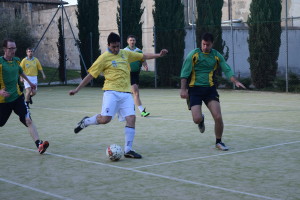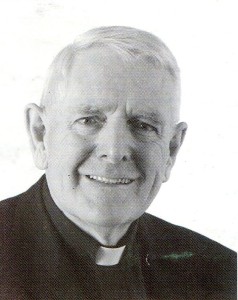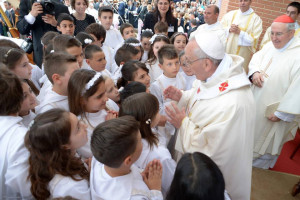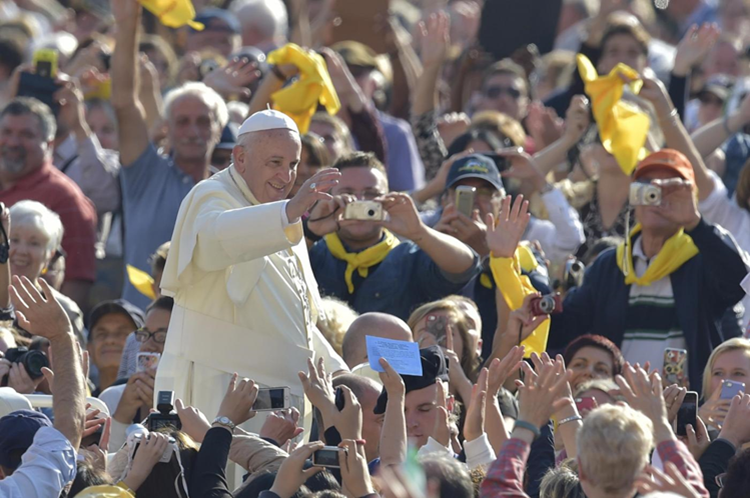St Columbanus – 1400th anniversary
Posted on 23. Nov, 2015 by John Coughlan in Carousel
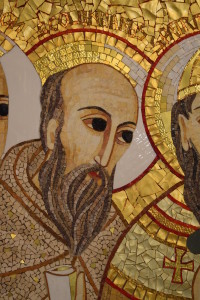
Saint Columbanus as depicted in the apse of the Chapel of All Saints of Ireland, by Fr Marko Rupnik SJ and the Centro Aletti.
The 23rd November 2015 was the 1400th anniversary of the death of Saint Columbanus and his feast day. Pope Benedict XVI described him as ‘the best known Irishman of the early Middle Ages’ in his General Audience talk of 11th June 2008. Here is the full text of the talk, telling the story of Saint Columbanus:
Dear Brothers and Sisters,
Today I would like to speak about the holy Abbot Columban, the best known Irishman of the early Middle Ages. Since he worked as a monk, missionary and writer in various countries of Western Europe with good reason he can be called a “European” Saint. With the Irish of his time, he had a sense of Europe’s cultural unity. The expression “totius Europae – of all Europe”, with reference to the Church’s presence on the Continent, is found for the first time in one of his letters, written around the year 600, addressed to Pope Gregory the Great (cf. Epistula I, 1).
Columban was born c. 543 in the Province of Leinster in southeast Ireland. He was educated at home by excellent tutors who introduced him to the study of liberal arts. He was then entrusted to the guidance of Abbot Sinell of the community of Cleenish in Northern Ireland, where he was able to deepen his study of Sacred Scripture. At the age of about 20 he entered the monastery of Bangor, in the northeast of the island, whose abbot, Comgall, was a monk well known for his virtue and ascetic rigour. In full agreement with his abbot, Columban zealously practiced the severe discipline of the monastery, leading a life of prayer, ascesis and study. While there, he was also ordained a priest. His life at Bangor and the Abbot’s example influenced the conception of monasticism that developed in Columban over time and that he subsequently spread in the course of his life.
When he was approximately 50 years old, following the characteristically Irish ascetic ideal of the “peregrinatio pro Christo”,namely, making oneself a pilgrim for the sake of Christ, Columban left his island with 12 companions to engage in missionary work on the European Continent. We should in fact bear in mind that the migration of people from the North and the East had caused whole areas, previously Christianized, to revert to paganism. Around the year 590, the small group of missionaries landed on the Breton coast. Welcomed kindly by the King of the Franks of Austrasia (present-day France), they asked only for a small piece of uncultivated land. They were given the ancient Roman fortress of Annegray, totally ruined and abandoned and covered by forest. Accustomed to a life of extreme hardship, in the span of a few months the monks managed to build the first hermitage on the ruins. Thus their re-evangelization began, in the first place, through the witness of their lives. With the new cultivation of the land, they also began a new cultivation of souls. The fame of those foreign religious who, living on prayer and in great austerity, built houses and worked the land spread rapidly, attracting pilgrims and penitents. In particular, many young men asked to be accepted by the monastic community in order to live, like them, this exemplary life which was renewing the cultivation of the land and of souls. It was not long before the foundation of a second monastery was required. It was built a few kilometres away on the ruins of an ancient spa, Luxeuil. This monastery was to become the centre of the traditional Irish monastic and missionary outreach on the European Continent. A third monastery was erected at Fontaine, an hour’s walk further north.
Columban lived at Luxeuil for almost 20 years. Here the Saint wrote for his followers the Regula monachorum – for a while more widespread in Europe than Benedict’s Rule – which portrayed the ideal image of the monk. It is the only ancient Irish monastic rule in our possession today. Columban integrated it with the Regula coenobialis, a sort of penal code for the offences committed by monks, with punishments that are somewhat surprising to our modern sensibility and can only be explained by the mentality and environment of that time. With another famous work entitled: De poenitentiarum misura taxanda, also written at Luxeuil, Columban introduced Confession and private and frequent penance on the Continent. It was known as “tariffed” penance because of the proportion established between the gravity of the sin and the type of penance imposed by the confessor. These innovations roused the suspicion of local Bishops, a suspicion that became hostile when Columban had the courage to rebuke them openly for the practices of some of them. The controversy over the date of Easter was an opportunity to demonstrate their opposition: Ireland, in fact, followed the Eastern rather than the Roman tradition. The Irish monk was convoked in 603 to account to a Synod at Chalon-sur-Saône for his practices regarding penance and Easter. Instead of presenting himself before the Synod, he sent a letter in which he minimized the issue, inviting the Synod Fathers not only to discuss the problem of the date of Easter, in his opinion a negligible problem, “but also all the necessary canonical norms that – something more serious – are disregarded by many” (cf. Epistula II, 1). At the same time he wrote to Pope Boniface IV – just as several years earlier he had turned to Pope Gregory the Great (cf. Epistula I) – asking him to defend the Irish tradition (cf. Epistula III).
Intransigent as he was in every moral matter, Columban then came into conflict with the royal house for having harshly reprimanded King Theuderic for his adulterous relations. This created a whole network of personal, religious and political intrigues and manoeuvres which, in 610, culminated in a Decree of expulsion banishing Columban and all the monks of Irish origin from Luxeuil and condemning them to definitive exile. They were escorted to the sea and, at the expense of the court, boarded a ship bound for Ireland. However, not far from shore the ship ran aground and the captain, who saw this as a sign from Heaven, abandoned the voyage and, for fear of being cursed by God, brought the monks back to dry land. Instead of returning to Luxeuil, they decided to begin a new work of evangelization. Thus, they embarked on a Rhine boat and travelled up the river. After a first stop in Tuggen near Lake Zurich they went to the region of Bregenz, near Lake Constance, to evangelize the Alemanni.
However, soon afterwards, because of political events unfavourable to his work, Columban decided to cross the Alps with the majority of his disciples. Only one monk whose name was Gallus stayed behind; it was from his hermitage that the famous Abbey of St Gall in Switzerland subsequently developed. Having arrived in Italy, Columban met with a warm welcome at the Lombard Royal Court but was immediately faced with considerable difficulties: the life of the Church was torn apart by the Arian heresy, still prevalent among the Lombards, and by a schism which had detached most of the Church in Northern Italy from communion with the Bishop of Rome. Columban entered authoritatively into this context, writing a satirical pamphlet against Arianism and a letter to Boniface IV to convince him to take some decisive steps with a view to re-establishing unity (cf. Epistula V). When, in 612 or 613, the King of the Lombards allocated to him a plot of land in Bobbio, in the Trebbia Valley, Columban founded a new monastery there which was later to become a cultural centre on a par with the famous monastery of Monte Cassino. Here he came to the end of his days: he died on 23 November 615 and to this day is commemorated on this date in the Roman rite.
St Columban’s message is concentrated in a firm appeal to conversion and detachment from earthly goods, with a view to the eternal inheritance. With his ascetic life and conduct free from compromises when he faced the corruption of the powerful, he is reminiscent of the severe figure of St John the Baptist. His austerity, however, was never an end in itself but merely the means with which to open himself freely to God’s love and to correspond with his whole being to the gifts received from him, thereby restoring in himself the image of God, while at the same time cultivating the earth and renewing human society. I quote from hisInstructiones: “If man makes a correct use of those faculties that God has conceded to his soul, he will be likened to God. Let us remember that we must restore to him all those gifts which he deposited in us when we were in our original condition. “He has taught us the way with his Commandments. The first of them tells us to love the Lord with all our heart, because he loved us first, from the beginning of time, even before we came into the light of this world” (cf. Instructiones XI). The Irish Saint truly incarnated these words in his own life. A man of great culture – he also wrote poetry in Latin and a grammar book – he proved rich in gifts of grace. He was a tireless builder of monasteries as well as an intransigent penitential preacher who spent every ounce of his energy on nurturing the Christian roots of Europe which was coming into existence. With his spiritual energy, with his faith, with his love for God and neighbour, he truly became one of the Fathers of Europe. He shows us even today the roots from which our Europe can be reborn.
Ministry of Reader 2015
Posted on 18. Nov, 2015 by John Coughlan in Carousel
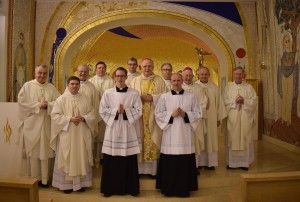
Left to right: Monsignor Ciarán O’Carroll (Rector), Fr Hugh Clifford (Director of Formation), Bishop Dónal McKeown (Derry), Bishop Francis Duffy (Ardagh and Clonmacnois), Mr Tony Shannon (new Reader), Rev. Stephen Duffy (Deacon), Bishop Leo O’Reilly (Kilmore, celebrant), Fr George Hayes (Vice Rector), Mr Seán Mulligan (new Reader), Bishop Philip Boyce (Raphoe), Bishop Brendan Kelly (Achonry), Fr Thomas Norris (Spiritual Director).
Two seminarians of the Pontifical Irish College, Rome, Mr Seán Mulligan (Diocese of Clogher) and Mr Tony Shannon (Diocese of Meath) were conferred with the Ministry of Reader by Bishop Leo O’Reilly of Kilmore at Mass in the College Chapel on 18th November 2015.
The Ministry of Reader is a Church ministry in itself, but it is also one of the steps along the way in formation for the Priesthood.
Here is the homily preached by Bishop O’Reilly at the Mass:
Last Sunday’s readings, from the book of Daniel and the Gospel of St Mark, were full of apocalyptic foreboding. We heard of great distress, cosmic chaos and things falling apart. In the midst of all this upheaval and uncertainty Jesus gives one ringing assurance to disciples: “heaven and earth will pass away but my words will not pass away.”
The word of Jesus will stand. The word of God is the one firm anchor in the stormy sea foretold by Jesus for his followers. These words must have reassured Peter in all the troubles he experienced as he preached the word – the hostility, the opposition and imprisonment. They must have strengthened Paul in his many travails – especially on his journey as prisoner to Rome. They stood to him when he and his companions were literally shipwrecked on the island of Malta and during his imprisonment in Rome where we find him in today’s reading. The astonishing thing is that the word of God, the message of Jesus continues to be proclaimed even from behind bars – as St Luke says – with complete freedom and without hindrance.
Heaven and earth will pass away, but my words will not pass away.
Today you will be instituted as readers, lectors, ministers of Gods word. This is one of what used to be called ‘minor orders’. But it is no small thing. The word of God is a powerful reality. The letter to the Hebrews tells us that it is sharper than any two- edged sword. So St Paul is invariably depicted in art – as he is in the great statue outside St Peter’s in the Vatican – with a two-edged sword in his hand. In the other great statue at the front of the basilica, St Peter is identified by the keys. The keys are the symbol of authority and in particular of the authority of St Peter as the authoritative preacher of God’s word in the Church.
The word of God is powerful because Christ is present in his word. You will recall that the Constitution on the Liturgy teaches that Christ is present at the celebration of Mass, not just in Communion but in the community gathered in his name, and in his word.
The responsibility for proclaiming God’s word then is a sacred one. You are making Christ present to your hearers as you proclaim his word. So while this ministry is a step on the road to priesthood for you, in a real sense it goes to the heart of what our priesthood is about. The Second Vatican Council’s document on priests has this to say: “Since no one can be saved who has not first believed, priests .. have as their primary duty the proclamation of the Gospel of God to all. (Presbyterorum ordinis 4) The liturgy of the ceremony says the same thing: “you will bring the message of salvation to those who have not yet received it.”
The Gospel gives us the classic image of the Church – Peter and the apostles in a fragile boat on a stormy sea. They are afraid, their faith is weak. They ask themselves, is Christ really with us or is he only a figment of our imaginations? That’s often how we experience the Church today. Things could seem to be falling apart. The ship is threatened with sinking. Commentators write about the Church as a thing of the past. Recently, a well-known commentator described it as a 1500 year old institution wiped out by the abuse crisis. We are being written out of the script. That is the world where you will proclaim God’s word.
Today’s Gospel is one to meditate on again and again. The words of Jesus: courage, it is I, do not be afraid, these are our defence. The word of Jesus will not fail. His word assures us the Church will not fail. Christ is with us – not as a shadowy, ghostly reality, but as a real presence in word and sacrament. Never forget that it is Christ’s word you proclaim; that heaven and earth may pass away, but Christ’s word will not pass away. You cannot share that word with others until you have accepted it yourself, till you have prayed and pondered it, tasted it and digested it.
I’ll leave you with the words of the ceremony itself: “In proclaiming God’s word to others, accept it yourselves in obedience to the Holy Spirit. Meditate on it constantly so that each day you will have a deeper love for the scriptures, and in all you say and do, show forth to the world Our Saviour Jesus Christ.”
Fr Ragheed Ganni Soccer Tournament 2015
Posted on 07. Nov, 2015 by John Coughlan in Carousel
The Fr Ragheed Ganni Memorial Soccer Tournament took place at the Irish College, Rome on Saturday, 7th November 2015. The annual tournament is dedicated to Fr Ragheed, an Irish College alumnus who was martyred for his faith in Iraq in 2007. Ragheed came to the Irish College in 1996 as a seminarian and was ordained priest in 2001. He stayed on in this college as a postgraduate priest until 2003 when he returned to Iraq. During his years in the Irish College, he played on the College soccer team, and so this tournament, the Fr Ragheed Ganni Cup was established in his memory.
Six teams took part, representing the Irish College, English College, Marist College, North American College, Beda College, and Scots College. An important feature of the Fr Ragheed Ganni Memorial Soccer Tournament is that it concludes with all the participants celebrating Vespers in the College Chapel. Fr Ragheed Ganni celebrated his first Mass as a Priest in this Chapel, and he is now depicted in the apse mosaic, carrying the martyrs’ palm branch.
Congratulations to the Venerable English College team, victorious in this year’s tournament.
To view photographs of the occasion, click here.
Ordinations to the Priesthood 2015
Posted on 06. Nov, 2015 by John Coughlan in Carousel
Two seminarians of the Pontifical Irish College, Rome were ordained to the Priesthood during Summer 2015.
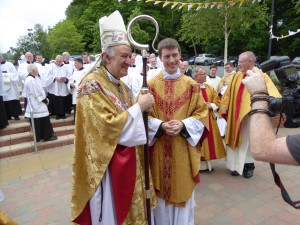
Fr Conor McCarthy with Bishop Anthony Farquhar, Auxiliary Bishop of Down and Connor after his ordination to the Priesthood.
Fr Conor McCarthy was ordained a Priest for the Diocese of Down and Connor by Bishop Anthony Farquhar, Auxiliary Bishop of Down and Connor, on 28th June 2015 in St Anne’s Church, Finaghy Belfast.
For photographs of the occasion, click here.

Fr Aidan McCann pictured after his ordination to Priesthood with the ordaining Bishop, Archbishop Eamon Martin and Irish College formation staff members Fr Hugh Clifford and Fr Tom Norris.
Fr Aidan McCann was ordained a Priest for the Archdiocese of Armagh by Archbishop Eamon Martin, Archbishop of Armagh and Primate of All Ireland, on 5th July 2015 in St Patrick’s Cathedral, Armagh.
For photographs of the occasion, click here.
Fr Joseph Cunningham C.M., RIP
Posted on 06. Nov, 2015 by John Coughlan in Carousel
The death has occurred of Fr Joseph Cunningham C.M., who was the Spiritual Director of the Irish College from 2002 to 2005. The College community sympathises with his family and his Vincentian confrères. Ar dheis Dé go raibh a anam.
Sacramental preparation programmes
Posted on 02. Nov, 2015 by John Coughlan in Carousel
On Sunday mornings during the academic year, Irish College Rome seminarians provide catechetical programmes (in the English language) for children preparing for First Holy Communion (around 8 years old) and for young people preparing for the Sacrament of Confirmation (from 12 years upward) after the 10am Mass. Over the course of the year, the seminarians involved discern with the parents and each child if this is to be the year for receiving the Sacrament or if he or she should continue in the programme for the following year. The children and young people learn more about their faith and are helped to grow in relationship with Jesus, to come to receive the Eucharist with a lively faith, and to experience the gifts and fruits of the Holy Spirit in their own lives. The programmes will begin in mid-October 2015. In May, the Sacraments of First Communion and Confirmation will be celebrated on different Sundays. Many families have appreciated this opportunity at the Irish College. The Irish College child safeguarding policy is fully implemented in all activities involved in the catechetical programmes.
For further information on the sacramental preparation programmes, please contact Fr Hugh Clifford by emailing formationdirector@irishcollege.org or by telephoning +39 06 772 63 202.
A Time for Priests 2015
Posted on 14. Sep, 2015 by John Coughlan in Carousel
A Time for Priests
Ongoing formation in prayer, preaching,
call and service
14th to 18th September 2015
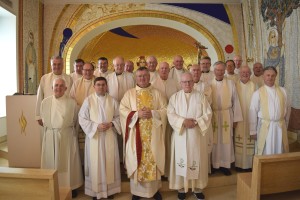
The participants of the 2015 Time for Priests with the College formation staff and presenter Fr Stephen Langridge
The Pontifical Irish College hosted a time of reflection, renewal and relaxation, from 14th to 18th September 2015, for priests availing of the opportunity to spend some days in Rome. The course provided participants with an opportunity to visit Rome while deepening their theological awareness through lectures and lived experience of the Church and City. This year’s course supported priests who are working in parishes and other pastoral assignments to be updated on preaching, on the promotion of vocations to the priesthood and on the overall care of the priest in the context of new pastoral challenges.
Those leading this year’s course included:
Fr. John Harris, OP, Regent of Studies of the Irish Dominican Province
Fr. Stephen Langridge, Vocations Director, Archdiocese of Southwark and Chair of Conference of Vocation Directors of England and Wales
Sr. Brenda Dolphin, Department of Psychology, Pontifical Gregorian University, Rome
Fr. Tom Norris, Pontifical Irish College, Rome
Liturgies were celebrated each day in the College Chapel with its beautiful Marko Rupnik mosaics and elsewhere. A general audience with the Holy Father, a visit to Subiaco, Castlegandolfo and the English College Villa at Palazzola, a day of reflection and recollection as well as an opportunity to enjoy many of the artistic and cultural delights of Rome formed part of this year’s programme.
If you wish to enquire about next year’s Time for Priests, please telephone the Irish College on the main office number at 00 39 06 772 631 or email ufficio@irishcollege.org
To view the flyer for ‘A Time for Priests’ 2015, click here: Time for Priests Irish College Rome
To see photographs from the days, click here.
A Course for Parishioners 2015
Posted on 08. Sep, 2015 by John Coughlan in Carousel
‘Handing on the Faith Today’, A Course for Parishioners was held at the Irish College, Rome from 7th to 11th September 2015.
To view a set of photographs from the course, click here.
During the days, participants were afforded an opportunity to reflect on the vital work of handing on the faith. The five days included a series of talks, liturgies and guided visits to significant Churches and Basilicas in Rome, a day of spiritual recollection and reflection, a visit to Castlegandolfo and Subiaco as well as an opportunity to attend a General Audience with Pope Francis.
Presentations were given by the following:
- Msgr. Ciarán O’Carroll (Pontifical Irish College, Rome) visited St. Peter’s Basilica, the Basilica of St. John Lateran and the Church of St. Peter in Chains, focusing on the deposit of faith which is at the heart of the Catholic Church.
- Ms. Maura Garrihy, Director of Youth Ministry, Galway Diocese, focused on how to deepen and support the faith of young people.
- Mrs. Catherine Wiley, founder of the Catholic Grandparents Association focused on her experience of grandparents in supporting the life of faith within the family.
- Fr. Tom Norris (Pontifical Irish College, Rome) led a day of reflection.
- Fr. George Hayes (Pontifical Irish College, Rome) looked at the use of art and beauty as a support in handing on faith.
- Fr. Hugh Clifford (Pontifical Irish College, Rome) offered insights into the formation work that goes on at the Irish College and its connection with the handing on of the faith.
If you wish to express interest in next year’s Course for Parishioners , please telephone the Irish College on the main office number at 00 39 06 772 631 or email ufficio@irishcollege.org
To view the flyer for ‘A Course for Parishioners’ 2015, please click here: A Course for Parishioners Irish College Rome
New vocations videos featuring the Irish College
Posted on 30. Aug, 2015 by John Coughlan in Carousel
Four seminarians of the Pontifical Irish College, Rome, tell their vocation stories to Fr Ruairí Ó Dómhnaill in this video produced by iCatholic:
To see a further video of an interview with Fr Ruairí Ó Dómhnaill, Vocations Director for the Diocese of Kildare and Leighlin, which includes the above Irish College seminarians’ interviews, click here.
The iCatholic ‘Called and Chosen’ series on on vocations to diocesan priesthood in Ireland:
Episode 1: Introduction to the series:
Ordination to Diaconate 2015
Posted on 01. Jun, 2015 by John Coughlan in Carousel
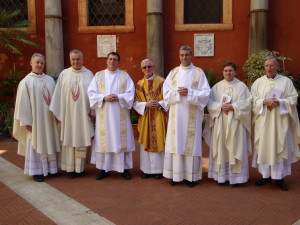
Left to right: Fr George Hayes (Vice Rector), Monsignor Ciarán O’Carroll (Rector), Rev. Daniel Gallagher (new Deacon), Bishop Martin Drennan (ordaining Bishop), Rev. Stephen Duffy (new Deacon), Fr Hugh Clifford (Director of Formation), Fr Thomas Norris (Spiritual Director).
A Monaghan man with a background in management in the food industry and a graduate in Irish and history from the National University of Ireland Galway, students of the Pontifical Irish College in Rome, were ordained deacons on Easter Tuesday, 7th April 2015 in Rome. The liturgy was celebrated in the Church of San Silvestro in Capite, an 8th century minor basilica dedicated to Pope Sylvester I, which is under the care of the Irish Pallotine Fathers and has Cardinal Desmond Connell as its Cardinal Priest.
Rev. Stephen Duffy (38) from Ballybay, Co. Monaghan and Rev. Daniel Gallagher (25) from Bohermore in Galway City were ordained by Bishop Martin Drennan of the Diocese of Galway who travelled to Rome for the occasion. In a moving ceremony, in which the two new deacons were joined by over eighty family members and friends, Bishop Drennan reminded the two deacons that “ at the heart of life is service. Every gift that God gives is not just for ourselves. It is for others, is to be shared and will bring most joy when it is shared”. He went on to say that “we need to name accurately what cripples. High on the list is an aggressive individualism that asserts my rights, my opinions, my beliefs and gives little space to inherited wisdom, tradition, institutions. ….large swathes of our world have forgotten two basic lessons that we all need to learn – there is a God an I’m not he! It is our privilege to remind people of God”. Focusing on the Gospel of the paralytic who was lowered through the roof into the presence of Jesus, Bishop Drennan continued “The more secular our world becomes the greater the difficulty it has with the idea of forgiveness. …Healed wounds don’t hurt but the unhealed wounds certainly do and without the touch of God’s mercy they continue to cause pain….Like those who laid the paralysed man before Jesus, we are called to find creative ways to bring people to Jesus, to make openings in places that shut people off from God, to identify accurately what paralyses, to bring it along and lay it before Jesus.”
The two deacons will be ordained to the priesthood in the next year for service in their respective dioceses, Clogher and Galway. Commenting after the Mass, Monsignor Ciarán O’Carroll, the Rector of the College, said: ‘This Easter Tuesday the Pontifical Irish College community rejoices with Stephen and Daniel. We thank God for their particular vocation in life and accompany them with our prayers. I wish them every blessing and happiness in the exercise of their diaconal ministry. May they be given the grace to proclaim the Gospel in both word and deed. May they serve the people of God in their respective dioceses with love, courage, care and compassion. Inspired by the example of Pope Francis may they be true friends to the poor and the voice of the forgotten. May the Lord, who has begun such good work in them bring it to completion’.
To view photographs from the occasion, click here.

